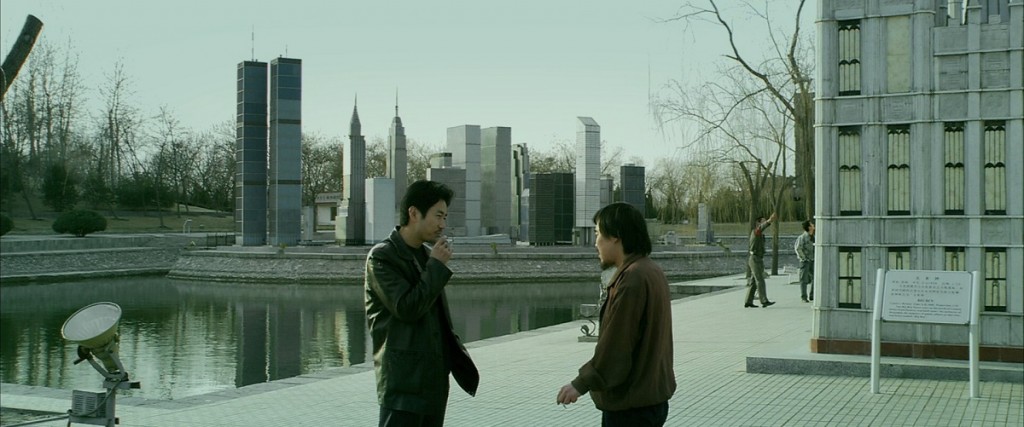
In the West, China is famous for its ripoffs–copycat smartphones, pirated DVDs with uncannily modified titles, and counterfeit luxury products. Movies and LV purses are just small fry though. Contemporary China has seen a rise in what some call “duplitecture”, or copies of architectural styles and landmarks from the US and Europe. Instances of this phenomenon range from unauthorized Apple Store clones to whole cities (e.x. “Thames Town”) and amusement parks built to emulate Western templates. The social and cultural undercurrents driving such mimicry are complex; Chinese oftentimes perceive copying as more “mastery” than taboo. Quickly building replicas of Western sites also conveniently displays China’s newfound economic prowess; when China can build its own White House and Capitol, the ones in Washington start to seem less formidable.
The prevalence of such mimicry can also be a manifestation of the insecurities and desires that came after Deng Xiaoping “reformed and opened” the country. With Western products and ideas swimming back into their nation, many Chinese started believing that “foreign means better”, so much so that some domestic companies have created the impression that they are foreign to attract consumers. Emulating foreignness, whether with buildings or bags, could be linked to China’s desire to compete against the West. Political posturing probably isn’t the main driver behind duplitecture though; desire and insecurity are fundamentally human feelings. Power, belonging, meaning, authenticity–these are the wants and needs of individuals, not necessarily nation-states.
At this intersection of duplitecture and desire lies Jia Zhangke’s 2004 film The World. The movie is set in Beijing World Park (this is a real place you can visit), an ultimate monument to contemporary Chinese simulacra which contains duplicates of foreign sites such as the Eiffel Tower, the Pyramids of Giza, Big Ben, the Leaning Tower of Pisa, and more. “Give us a day, and we’ll give you the world,” the park claims in its advertising. In a way, the statement is true: in the course of one afternoon, you could go from Japan to Italy, London to New York, Taj Mahal to Sphinx — as long as you are okay with copies, that is. “See the world without leaving Beijing,” the park exhorts. But is that really possible?
The World primarily profiles two workers in the park, Tao (Zhao Tao) and her boyfriend Taisheng (Chen Taisheng). In classic Jia Zhangke style, the two are downtrodden migrants from Shanxi. Tao is a performer who alternates between costumes from around the world: one day she’s an Indian dancer, another she’s a geisha. Taisheng protects “the world” as a security guard and moonlights as a forger for fellow Shanxi migrants. Insecurity impregnates their relationship, as well as the interactions of other workers in the park. Day after day, both on stage and in their lives, The World‘s characters put on a performance, converting desire into subtle lies for others and self. Trapped within the multiple metaphorical layers of this fake world, Tao and Taisheng watch the show go on; some cast members escape to travel the real world outside, but we don’t know for sure if the two main protagonists have such ambitions.
Plot-wise, The World is a simple film with a huge amount of complex meaning. The fact that it is set in Beijing World Park provides ample easy material for Jia to work off of, and he exploits it well. As I mentioned in my review of A Touch of Sin, Jia’s strength is in telling authentic stories from contemporary China’s cultural milieu, and that strength is heavily evident in The World. The film is nowhere near as overtly political as A Touch of Sin (which directly depicts corruption) though, and as a result it was actually sanctioned by the Chinese government and shown in mainland theaters. Some critics were afraid that this would dilute the film’s creative qualities, but, unless you’re looking for some heavy commentary on fighting tigers and flies (that’s an anti-corruption quote from Xi Jinping, who wasn’t even in power when The World was made), that fear is unfounded.
The World is somewhat innovative for a Jia Zhangke film in that, besides being set entirely in Beijing instead of Shanxi, it includes short animations of the characters at multiple junctures. The animations somewhat confused me; though I could see them adding value on the theme of simulacra, they weren’t entirely necessary for the film to proceed. Innovations on the front of music, however, pleased me more. Apparently Jia worked with Taiwanese composer Lim Giong, who also helped score Hou Hsiao-hsien’s Three Times, to produce The World‘s very modern-sounding soundtrack. Lim’s brooding electronic beats created a perfect atmosphere for the film’s imagery, and I almost wish I could’ve seen/heard The World in an actual theater like I did with Three Times.
Even today, more than a decade after the film’s release, The World remains highly relevant; the lack of overt political material actually creates a sort of timeless strength. I recently finished Age of Ambition: Chasing Fortune, Truth, and Faith in the New China, a book on contemporary China by Evan Osnos, the New Yorker‘s China correspondent and one of my favorite writers, which won last year’s National Book Award for Nonfiction. As implied by his book’s subtitle, Osnos explores many of the same themes that Jia touches on in The World–authenticity, exploration, agency. In fact, Osnos actually features Jia Zhangke in his book, which is built partially off excerpts of Osnos’ New Yorker articles, including this one entirely about Jia. Unsurprisingly, I couldn’t help thinking of Osnos’ writing as I watched The World. In this age of ambition, The World could be China’s oyster–a striving, confusing place where simulacra abound amidst ephemeral truth.
The World (Chinese: 世界)– China. Directed by Jia Zhangke. First released September 2004. Running time 2hr 15min. Starring Zhao Tao and Cheng Taisheng.